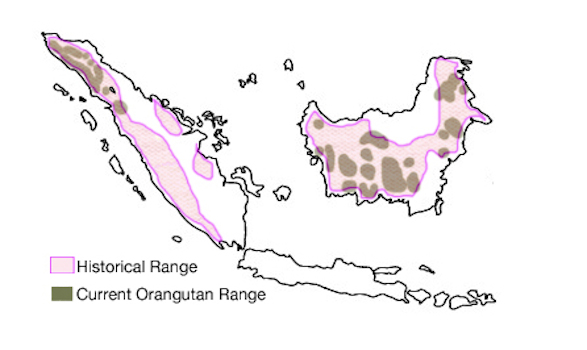Advocacy:
Free-living Orangutans
- Free-living orangutans are native to the islands of Borneo and Sumatra in southeast Asia. The population of wild orangutans has decreased dramatically in recent years and orangutans are rapidly facing extinction.
- Habitat loss is the biggest threat to orangutan populations. This is directly impacted by the palm oil industry. Once-dense forests in Indonesia are cleared and converted to palm tree plantations.
- Palm oil is very ubiquitous and is found in thousands of food and bath care products throughout the world. Nearly half of the world’s palm oil plantations are in Indonesia.
- Habitat is also lost to illegal logging, which accounts for up to half of timber production in Indonesia.
- When food is scarce, orangutans are known to raid crops and are often considered pests, which can result in a fatal shot from farmers.
- Orangutan’s inter-birth interval is the longest of any nonhuman primate. Infants stay with their mothers until they are about 8 years old, and mothers don’t reproduce until their infants have become independent. With this fairly low birth rate, the death rate due to habitat loss is rapidly outweighing the number of births, directly impacting population growth (more information on orangutan behavior here).
- The illegal pet trade is also responsible for population decline. Mothers are killed and their orphans are sold as pets. Orangutan sanctuaries in Indonesia are stretched thin trying to care for displaced wild orangutans and also providing homes for young orphans who have become part of the pet trade .
- Become an advocate for orangutan populations. Be a conscious consumer and avoid products containing palm oil.





